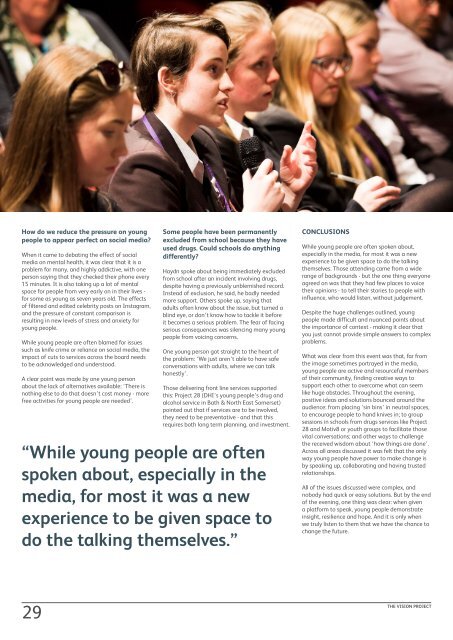The Vision Project
Throughout 2019, Developing Health & Independence (DHI), have been marking their 20th anniversary as a charity by looking to the future. Through articles, events and podcasts, they've asked people to answer the question of how we can achieve their vision of ending social exclusion. This collection of articles includes the contributions of experts from across public life and the political spectrum.
Throughout 2019, Developing Health & Independence (DHI), have been marking their 20th anniversary as a charity by looking to the future. Through articles, events and podcasts, they've asked people to answer the question of how we can achieve their vision of ending social exclusion. This collection of articles includes the contributions of experts from across public life and the political spectrum.
You also want an ePaper? Increase the reach of your titles
YUMPU automatically turns print PDFs into web optimized ePapers that Google loves.
How do we reduce the pressure on young<br />
people to appear perfect on social media?<br />
When it came to debating the effect of social<br />
media on mental health, it was clear that it is a<br />
problem for many, and highly addictive, with one<br />
person saying that they checked their phone every<br />
15 minutes. It is also taking up a lot of mental<br />
space for people from very early on in their lives -<br />
for some as young as seven years old. <strong>The</strong> effects<br />
of filtered and edited celebrity posts on Instagram,<br />
and the pressure of constant comparison is<br />
resulting in new levels of stress and anxiety for<br />
young people.<br />
While young people are often blamed for issues<br />
such as knife crime or reliance on social media, the<br />
impact of cuts to services across the board needs<br />
to be acknowledged and understood.<br />
A clear point was made by one young person<br />
about the lack of alternatives available: ‘<strong>The</strong>re is<br />
nothing else to do that doesn’t cost money - more<br />
free activities for young people are needed’.<br />
Some people have been permanently<br />
excluded from school because they have<br />
used drugs. Could schools do anything<br />
differently?<br />
Haydn spoke about being immediately excluded<br />
from school after an incident involving drugs,<br />
despite having a previously unblemished record.<br />
Instead of exclusion, he said, he badly needed<br />
more support. Others spoke up, saying that<br />
adults often know about the issue, but turned a<br />
blind eye, or don’t know how to tackle it before<br />
it becomes a serious problem. <strong>The</strong> fear of facing<br />
serious consequences was silencing many young<br />
people from voicing concerns.<br />
One young person got straight to the heart of<br />
the problem: ‘We just aren’t able to have safe<br />
conversations with adults, where we can talk<br />
honestly’.<br />
Those delivering front line services supported<br />
this: <strong>Project</strong> 28 (DHI’s young people’s drug and<br />
alcohol service in Bath & North East Somerset)<br />
pointed out that if services are to be involved,<br />
they need to be preventative - and that this<br />
requires both long term planning, and investment.<br />
“While young people are often<br />
spoken about, especially in the<br />
media, for most it was a new<br />
experience to be given space to<br />
do the talking themselves.”<br />
CONCLUSIONS<br />
While young people are often spoken about,<br />
especially in the media, for most it was a new<br />
experience to be given space to do the talking<br />
themselves. Those attending came from a wide<br />
range of backgrounds - but the one thing everyone<br />
agreed on was that they had few places to voice<br />
their opinions - to tell their stories to people with<br />
influence, who would listen, without judgement.<br />
Despite the huge challenges outlined, young<br />
people made difficult and nuanced points about<br />
the importance of context - making it clear that<br />
you just cannot provide simple answers to complex<br />
problems.<br />
What was clear from this event was that, far from<br />
the image sometimes portrayed in the media,<br />
young people are active and resourceful members<br />
of their community, finding creative ways to<br />
support each other to overcome what can seem<br />
like huge obstacles. Throughout the evening,<br />
positive ideas and solutions bounced around the<br />
audience: from placing ‘sin bins’ in neutral spaces,<br />
to encourage people to hand knives in; to group<br />
sessions in schools from drugs services like <strong>Project</strong><br />
28 and Motiv8 or youth groups to facilitate those<br />
vital conversations; and other ways to challenge<br />
the received wisdom about ‘how things are done’.<br />
Across all areas discussed it was felt that the only<br />
way young people have power to make change is<br />
by speaking up, collaborating and having trusted<br />
relationships.<br />
All of the issues discussed were complex, and<br />
nobody had quick or easy solutions. But by the end<br />
of the evening, one thing was clear: when given<br />
a platform to speak, young people demonstrate<br />
insight, resilience and hope. And it is only when<br />
we truly listen to them that we have the chance to<br />
change the future.<br />
29<br />
THE VISION PROJECT




